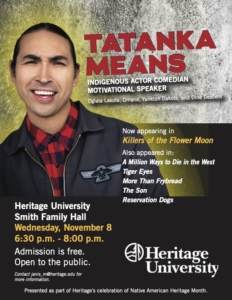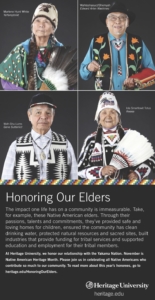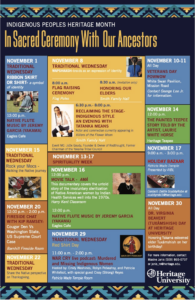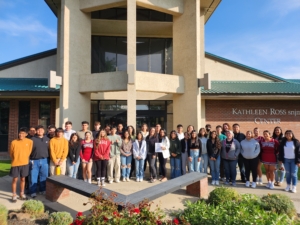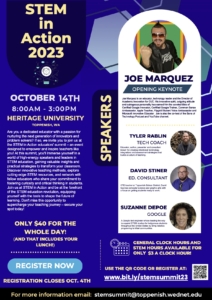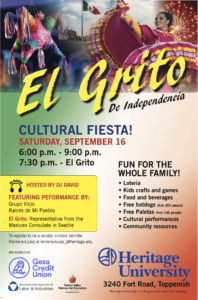Teaching Through Tech
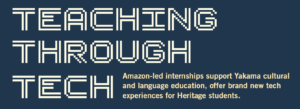
In the future, the tour guides at your local museum may look a little different. Meet “Astro”, a 17-inch-tall, plastic, metal and microchipped companion being readied by Heritage students to accompany patrons as they make their way through museum displays and collections.
Part “Alexa,” part computer, Astro currently exists as a “household helper/security assistant,” as marketed by its creator, Amazon. Astro is comprised of a computer screen bearing circles that look like eyes, a stem-like portion that resembles a neck, and wheels that seem like a combination of arms and legs. Its programmers note that “he” so sufficiently resembles a human that it’s hard to refer to this little robot as “it.”
 A few months ago, Amazon approached Heritage with an opportunity for computer science students to work with the tech company’s project engineers to program Astro for use in museums and cultural centers. The students would add to existing programming to tailor it to museums’ needs with the goal of creating a personalized and interactive experience for patrons and the museum alike.
A few months ago, Amazon approached Heritage with an opportunity for computer science students to work with the tech company’s project engineers to program Astro for use in museums and cultural centers. The students would add to existing programming to tailor it to museums’ needs with the goal of creating a personalized and interactive experience for patrons and the museum alike.
The content information programmed into Astro would depend upon the museum in which it was serving. In a museum in the Yakima Valley with exhibits about the flora and fauna of the area, for example, patrons may stand in front of a display and see a red-wing black bird sitting on a fence rail. The patron can ask Astro, “What does a red- wing black bird sound like?” On cue, Astro would play an audio file of the bird’s call.
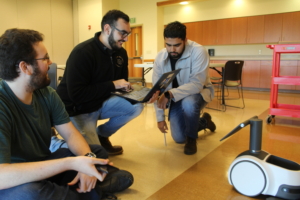
Colton Maybee (left), Robert Barragan (center) and Salvador Ayala (right) run tests on their Astro program.
Three students signed on to the project: Colton Maybee, Robert Barragan and Salvador Ayala. All three are upperclassmen majoring in computer science. They started working on the project this summer and continue to spend at least three days a week using Amazon program language to create their customized audio/command system.
In preparation for their work, Barragan shadowed museum managers to learn more about their organizations’ needs and how they can help Astro meet their needs. “One of the things they identified they’d like was an evacuation drill function that doesn’t have any language barriers,” Barragan said. “That’s a very specific need that we can definitely program in.”
Partnering museums can choose audio from the internet as well as play their own audio files, with the students assisting in programming. Students received instruction from their Amazon mentors at the start of the project. “They’re always there for us for any questions we might have, but mostly, we’ve been free to work on our own, and that’s what we’ve been doing,” said Maybee.
One of the things identified is Astro needs to have prompts programmed that allow it to go from point A to point B, following someone who has asked a specific command, and to keep within three to four feet of a group or tour guide. Maybee explained that when Astro is ready to go to a specific museum, he’ll be programmed with the museum layout and use a laser system, advanced learning algorithms, and sensor fusion to know where he is. Like Alexa, Astro will only respond when specifically asked and only to certain people.
Astro is one of two Amazon-involved projects Heritage students are working on via internships, said David Wise, Heritage’s vice president of advancement and communications. “Amazon had this really brilliant idea to provide museums with this robot to add to the immersive experience of tours, particularly at smaller, rural museums such as the ones you find in the Yakima Valley,” Wise said. “It’s one of two really meaningful projects they’ve committed to this year.”
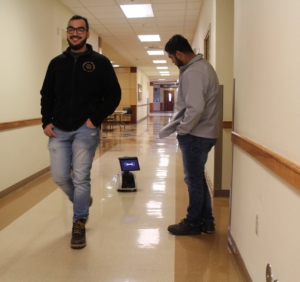
Astro is programmed to follow the tour group, staying within three or four feet of the party.
Amazon partners say their involvement can help students of all backgrounds to become builders of the future and to be representative of all customers the organization serves. “This partnership is part of an effort to reach students where they’re at and create that bridge to career opportunities and help ensure a future of diverse leaders,” said Lindsey Neby of Amazon. “This may seem small relative to the size and business of Amazon, but the impact is huge for those in this community. We’re first and foremost a customer-centric company, and this is the right thing to do by our customers and our geographic neighbors.”
Ayala, who was born in Mexico, calls the work a “dream come true.” Barragan says it’s the “most fun” project he’s worked on.
Could lots of Astros soon be rolling around museums across the country?
“This will work in the museums around Yakima because their size and numbers of visitors are more modest,” said Maybee. “It’s a good place to start this off. As technology progresses, who knows? This could be a possibility, and we’re the first to be working with it.”
Íkuuk iwá Wának’it, níiptit ku túskaas lkw’i, Wisalíla Álxayxpa…
Ask Alexa for something called the “Ichishkíin flash briefing,” and the first thing you hear is the date. In this case, the statement above translates in English to “Today is Monday, November 27.”
It is followed by a short news and information piece, a weather forecast, and information on a community activity or two, all of which will be in the native language of the Yakama people. You can hear flash briefings on a lot of platforms and about a lot of subjects and places, but until now, none in Ichishkíin. The new briefings are the result of another Heritage-Amazon project, meant to pique interest and challenge Ichishkíin language learners from beginners to moderately skilled to fluent. For those who don’t understand Ichishkíin, there is an English version as well.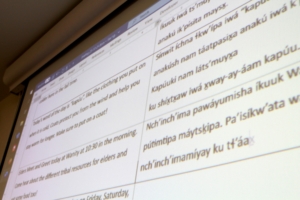
Working in Amazon-funded internships, two Heritage students, Shelby Yallup and Angelique Williams, gather information and write short news items. Another project partner at the Yakama Nation, Keegan Livermore, translates their copy into Ichishkíin, then speaks and records it. The students do some light editing and then upload the recording to the Amazon platform.
Twice a week – on Tuesdays and Fridays – a two- to four-minute briefing is available on command via Amazon’s Alexa. It’s a one-of-a-kind learning and “tech” experience for Yallup and Williams – and it’s a significant part of an effort being made by the Yakama tribe to keep the officially “endangered” language of Ichishkíin, also known as Sahaptan, alive, understood, and spoken.
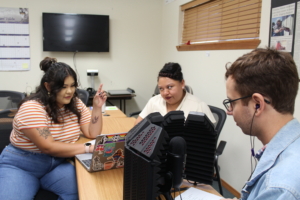
Shelby Yallup (left) and Angelique Williams (center) work with Keegan Livermore to produce the Yakama news briefing that is broadcast in Ichishkíin over Alexa.
Increasingly serious efforts over the last couple of years to teach the language to more young people began with a decision by the Yakama tribal council. “Basically, they said, ‘This is a big deal, and we need to do it right to keep our language going,” Livermore said.
“Doing it right” translated to hiring Livermore as strategic planning manager of the Yakama Nation Language Program and bringing on five full-time staff members he directs. Now a program that had been dormant is making strides.
“This is an exciting opportunity for the students to work with cutting edge technology, real-world work experience, [and] Amazon’s culture of Leadership Principles, which provides a mental framework for decision making, problem-solving, and professional growth.” –Lindsey Neby, Amazon
Staff members are creating learning materials, instructing community teachers, and passing on their knowledge wherever they can.
“With only a couple dozen speakers currently, that’s important,” Livermore said. “Yakama people with a ‘very high’ proficiency, meaning fluent or near fluent, are our grandparents’ generation. We have a couple of speakers who are a little younger and pretty good at the language, and they’re very involved culturally and with the community. We’re in Head Start, pre-K through 12, and high schools.”
Williams says she believes in the project and what it can do for the Yakama people and others. “Ichishkíin is the first language in this area, and we can be fluent in it again.” “We always ask, ‘How do we push those who have learned a little to use what they know and learn more?’” said Livermore. “This is a great way.”
He appreciates Heritage’s and Amazon’s involvement as critical pieces of the puzzle. “As an Ichishkíin speaker, I value Heritageconnecting on this with the tribe and with Amazon.They are both true community partners.”![]()

